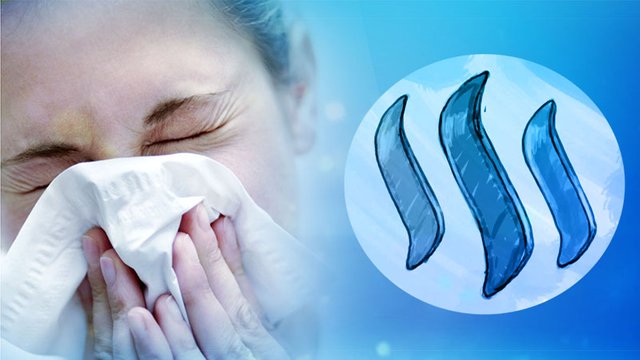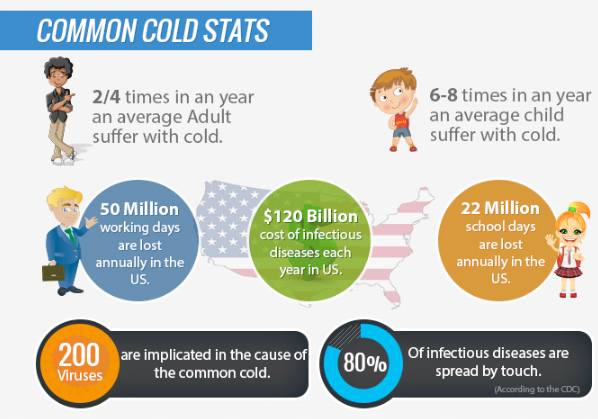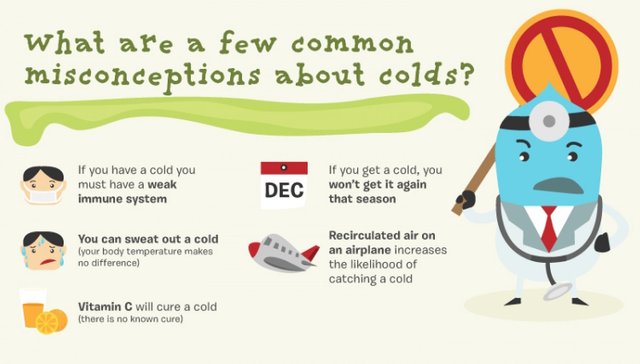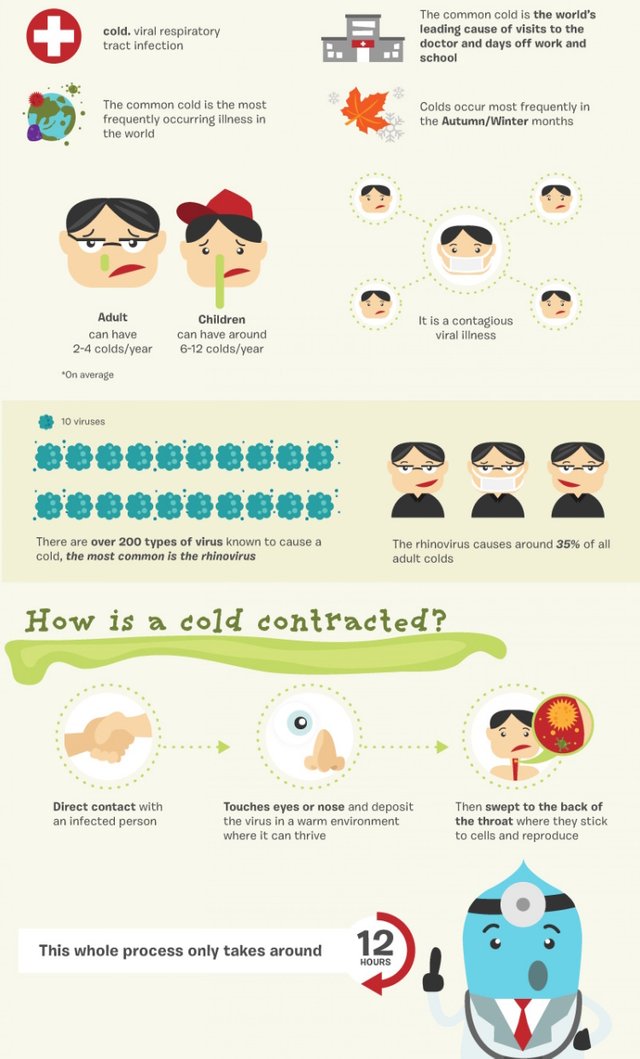Popular Misconceptions About The Common Cold!

As the weather is getting cooler, a lot of people around us are starting to catch a cold.
The common cold affects almost everyone, and comes with annoying symptoms like a stuffy nose, coughing, headaches, light fever, and an overall feeling of exhaustion.
The cold is so common that there are also thousands of myths around it - sayings and tips that have been passed down for generations.
But many of them are either false or only partly true - so let's look at some examples of cold myths that science has debunked!

You get sick from being cold.
This is maybe the most common myth ever, and it's something grandma's and mom's like to tell their kids.
But is this actually true?
You only catch a cold from a virus. If there are no viruses around, you won't get sick, no matter how cold you feel.
But obviously people get sick a lot more during the winter months, so there has to be some kind of connection.
When it gets cold outside, we turn on the radiator and the air around us gets more and more dry.
As a result, the mucus in your nose (which normally acts as a protection against pathogens) dries out, and also viruses spread easier and quicker in less humid environments.
Also, we tend to spend much more time indoors during the winter - which means we spend more time closer to other humans, which means there are more opportunities for a virus to spread.
And lastly, humans tend to get way too little Vitamin D during the winter months, because they rarely step outside. But a lack of Vitamin D actually weakens your immune system, making you more prone to catch a cold.
So in conclusion, you don't get sick only by being cold - but the cold season comes with many aspects that influence and increase the risk of getting sick.
Going outside with wet hair will make you sick.
This ties in with the first myth:
While going outside with wet hair will probably make you feel cold and uncomfortable, it has no direct connection to getting sick.
If there are no viruses around, you won't get sick, even if the wet hair makes you feel very cold.

You shouldn't exercise when you're sick.
Well, this one depends a lot on the situation.
Rest is very important for your body when you're sick, and a full-out workout will take a large toll on your body.
But studies have shown that staying active on a moderate level can help you feel better (although your body probably doesn't recover any faster from it.)
You should at least try to go on a 15min. walk every day, so that you can get some fresh air and your body's circulation gets a boost.
You should cover yourself when sneezing/coughing.
This is only partly true.
When you need to sneeze or cough, you should definitely try to cover your mouth or nose to prevent the spreading of the virus even a little - but you should not do so with your hands, like most people do.
We touch everything with our hands - door knobs, our phones, stair railings... So if we get the germs on our hands, we actually increase the risk of infecting others.
The better solution would be to sneeze "into your elbow" so that the germs don't reach your hands.
And of course, wash your hands thoroughly and often.

You are most contagious before there are any symptoms of your cold.
Yes, you are contagious as soon as you have caught the virus - whether you already feel its effects or not. But that's not actually when you're most contagious.
You are at the highest risk to contaminate others around 2-4 days after you've caught it.
By then, you definitely already feel the symptoms - this might actually be the time period where you feel most sick. So it only makes sense that the virus is the strongest at this point.
You shouldn't eat dairy products when you're sick.
You might've heard the myth that diary thickens your phlegm, and therefore you should avoid it when being sick.
But actually, scientists have found no connection between diary products and phlegm, so it doesn't harm your health (unless of course you're lactose-intolerant anyway).
You can protect yourself against the cold by getting vaccinated.
This is probably one of the biggest myths - many people believe that they can get flu shots and then they will stay perfectly healthy throughout the winter season.
What you need to know though, is that these shots work against the flu - and the flu is a different disease than the common cold.
A flu is much more severe and comes with high fever, while a cold often only includes a stuffy nose, a cough and slight fever symptoms.
So while it may be a smart move to protect yourself against the flu, it still won't protect you from catching a common cold.

As you can see, many common myths about catching a cold are outdated or simply not true.
There is no real cure or protection against the common cold, so it's just something we have to bear with from time to time.
Just view it as a chance to appreciate the things you normally take for granted!
Which of these myths did you believe previously? And which one surprises you the most?
Images: 1, 2, 3, 4, 5, Sources: 1, 2, 3
- Instagram -

© Sirwinchester
This post has been ranked within the top 25 most undervalued posts in the second half of Dec 29. We estimate that this post is undervalued by $13.82 as compared to a scenario in which every voter had an equal say.
See the full rankings and details in The Daily Tribune: Dec 29 - Part II. You can also read about some of our methodology, data analysis and technical details in our initial post.
If you are the author and would prefer not to receive these comments, simply reply "Stop" to this comment.
I always believed that you will get sick from being cold ^.^ good to know
That's probably one of the most popular myths ever!
Excellent post! My Mom always told me I'll "catch my death" if I went outside without my coat on, or that I'd catch a cold, and I'd go outside without a coat just to prove a point! Nice to know I was right for a change hahaha.
Hahaha, didn't we all try to prove a point to our parents as kids! And yes you were actually right!
Re cold - there is very little research done to prove or disprove that there is a relationship between getting cold (as in freezing) and getting the cold (as in getting ill); I did some meta-research on this some years ago and all I could find was two studies done, with opposite conclusions.
The story is told by countless of grandmas and grandpas, in different variants, in countless of different cultures. A false myth can easily survive in one culture - but it's so widespread that I find it hard to believe there isn't a speck of truth to it. It seems plausible that the immune system works better when one is having a normal body temperature.
Thanks for your feedback, very true! I would guess that most people still believe you can catch a cold from being cold, it's such a common thing
I had this thing happening to me in St.Petersburg yesterday; it was a relatively warm day, maybe +3C. Some of us (including me) has indeed has caught the cold those days, so despite the warm weather we were dressed for quite much colder weather. We had just been eating in a café, we were out on the street, but still not fully dressed, I had my jacked and my daughters jacket over my shoulders. My 3 yrs old daughter had a thick woolen sweater, and a water/wind-tight high trouser w/ braces covering the chest and back, and she had a hat as well, so she was more than adequately dressed for the weather. Guess what happened ... some lady came out of nowhere, cursing on me in Russian for not dressing my daughter well enough, and helped her get the jacket on! She would certainly get ill without the jacket, she meant!
I am fortunate that I have seldom gotten ill from a cold or otherwise. My method is keeping positive and not suggesting to myself that I will become ill. It gets very cold out here and I often go outside for short periods free of appropriate clothing or go into the garage bare foot. If the mind says no to illness, your body will less likely become ill. What we believe is what we achieve!
Other things worth mentioning ... alcohol most certainly won't help, it will most probably weaken the immune system. Still alcoholic bewerages are popular for "curing" the cold. Of all remedies not helping against a cold, a good glass of cognac will at least make the wait more comfortable, and having the cold is a good excuse for enjoying a small glass of Rigas Balzam.
Coffee is probably also counter-productive.